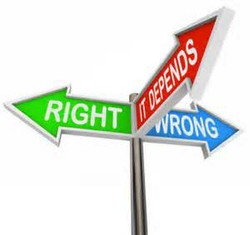Have you ever wondered – particularly in light of recent international events – why people who claim to be superbly religious, even fanatically so, seem to do such perverse and often violent things?
Years ago author/playwright Oscar Wilde wrote, “Morality, like art, means drawing a line someplace.” Today that definition may not be sufficient and lines often shift. You don’t have to look far beyond the daily news headlines to see or read of unspeakable crimes being committed by persons or organizations that declare themselves to be religiously devout and claim that because others are not as devout as they there is justification in conquering, demeaning and often killing those who don’t believe or behave as they.

The Religious And Immoral Acts
Why do extremists do what they do and how are immoral acts explained
If that’s something you’ve been asking welcome to the club. I’ve done a little research on the subject in order to find an answer to the question of how devout believers can sometime behave so intolerantly toward others. There is a wealth of information in articles, books, and research studies. What became very clear is that the question can’t be answered to everyone’s satisfaction, but I found some studies that at least shed a little light on the matter.
The Cheating Game
For example, there have been many studies that use a technique wherein a group of volunteers are asked to play games that tempt one segment of a group to cheat at the game. Researchers found that religious believers act more morally than nonreligious people in such games but only when they are interacting with members of their own religious community or among people who hold similar beliefs.
In more recent such studies researchers have gone a step further and used technology to do the testing. In a 2014 study, scientists used a smartphone app to track what they termed the “sins” and “good deeds” of more than 1200 volunteers. They found that religious people and non-religious people are equally likely to commit “immoral” acts. How did the researchers deduce this? Using various social networks they had the volunteers, age 18 to 68, download an app with the promise that they could win an iPod Touch in a lottery. The app, they were told, allowed the researchers to ‘buzz’ them with a text message five times a day. When the volunteers opened the resultant text messages they were asked to report if they’d witnessed, heard about, or performed any moral or immoral acts within the past hour. The researchers got more than 13,000 messages as a result in which the volunteers confessed to a number of offenses. Some of the admissions were quite startling, including arranging for an adulterous affair. But, there were also plenty of ‘good deeds’ reported as well.
But when the results were analyzed, the researchers found that the volunteers who identified themselves as religious or non-religious were both equally likely to perform moral or immoral acts irrespective of their stated beliefs or lack thereof.
While a number of variables make the study outcomes less than 100 percent perfect or applicable in all situations it does give some insight into how people act whether they espouse strong religious or belief convictions or not.
The Role of Authority
Another area of research has shown that religious authorities or strong religious institutions determine what is permissible or impermissible for people in their daily lives. However, in the absence of such strong leadership the belief in right or wrong can become less distinct because there is no higher authority (at least on earth) to reinforce the belief. In such situations a vacuum is created into which a self-styled ‘leader’ can take charge and offer an unchallenged view of right or wrong that may or may not be compatible with more ‘mainstream’ beliefs.
In a 2009 study, The Double-edged Sword of a Moral State of Mind, researchers at the University of Illinois at Chicago (UIC) quote a study (Mischel & Mischel, 1976) that opines, “atrocities that were justified by invoking the highest principles and that were perpetrated upon victims who were equally convinced of their own moral principles. In the name of justice, of the common welfare, of universal ethics, and of God, millions of people have been killed and whole cultures destroyed. In recent history, concepts of universal rights, equality, freedom, and social equity have been used to justify every variety of murder including genocide.”
The UIC researchers went on to say, their “findings suggest that morality is a double-edged sword, capable of contributing to behavior that can easily be construed as anything but moral. Although primarily associated with pro-social and positive consequences, people’s moral convictions, motives, and sentiments are sometimes associated with negative and anti-social consequences as well.”
The discussion of morality and how one group or another defines it is a never-ending one. One would hope there is a universally accepted definition of morality and moral acts. Sadly, news headlines keep suggesting this is not true. As. Dr. T.P. Chia said, “Morality is often rendered impotent by human selfishness, avarice and wickedness. And few people take morality seriously, or are committed to what is morally right, when personal interests are at stake.” As a result moral behavior is increasingly that which every individual must take responsibility for.
You might also like
The ‘Ice Bucket Challenge” – How Do You Know A Charity Is Legi...The Ice Bucket Challenge is raising lots of money for ALS, but how do you kno...
Public Breast-Feeding – Right Or Wrong?Breast-feeding in public is sometimes controversial, as a recent incident in ...
Do Good Luck Charms Work?Do good luck charms work? Some have a very violent and grizzly history. Read ...












 The Problem With Wizzley and Amazon Associateson 10/17/2014
The Problem With Wizzley and Amazon Associateson 10/17/2014
 Happy Wife, Happy Life: Is It True?on 10/02/2014
Happy Wife, Happy Life: Is It True?on 10/02/2014
 Arborsculpture Designs Are Beautiful And Practicalon 09/30/2014
Arborsculpture Designs Are Beautiful And Practicalon 09/30/2014
 The Age Factor And Online Surveyson 09/21/2014
The Age Factor And Online Surveyson 09/21/2014




Comments
TheWritingCowboy, It's interesting that killing or persecuting others was not part of early Christianity when believers were a minority looking forward to the Second Coming.
Great article. I was thinking about something like this the other day. I'm a Christian, as are a lot of people I know and I find it so frustrating how they put certain sins above others. For example, several of my friends are against gay marriage because the Bible tells us it's a sin. However, for some reason it's okay for them to have premarital sex with 20+ people, including a few same sex partners but because it was only physical, that somehow makes it acceptable for them to do but it's just not acceptable for gays to get married? It drives me insane. If it's legal to get married when you've had premarital sex, it should be legal for same sex couples to marry.
I'm sorry, I know that wasn't your topic but that's what I thought about when I read this.